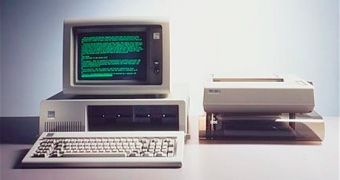Thirty years have passed since the invention of the first personal computer, but celebrations may have been cut short by a not-so-optimistic statement on the part of an IBM executive.
Some may not remember, but it was IBM that created the very first personal computer to ever grace the world with its presence.
Dubbed IBM PC, it was released thirty years ago and practically started a new age, leading to the situation of today, when such machine are more or less the norm.
The reasons the product took off so well are the low price,for the time ($1,565), and the fact that it was the first machine to run an operating system from Microsoft (PC-DOS). It had the 4.77 MHz 8088 Intel processor.
“This is the computer for just about everyone who has ever wanted a personal system at the office, on the university campus or at home," said C. B. Rogers, Jr., IBM vice president and group executive, General Business Group, in the original press release (August 12, 1981).
"We believe its performance, reliability and ease of use make it the most advanced, affordable personal computer in the marketplace."
With a product having so thoroughly reshaped the worldwide industry, one would think that this occasion would be cause for nothing but joy, nostalgia and awe.
Apparently, this are not the sort of feelings that IBM's CTO Mark Dean conveys in his recent blog post, though one could say he might be at least partially justified.
Basically, while pride over the achievement is in no shortage, the executive expresses some melancholy over the fact that the PC has already started to decline.
“When I helped design the PC, I didn’t think I’d live long enough to witness its decline. But, while PCs will continue to be much-used devices, they’re no longer at the leading edge of computing,” he says.
“They’re going the way of the vacuum tube, typewriter, vinyl records, CRT and incandescent light bulbs.”
IBM is now striving to ensure it will be at the forefront of the so-called Post-PC era, where mobile versatility, compactness and power efficiency will be major concerns.

 14 DAY TRIAL //
14 DAY TRIAL //